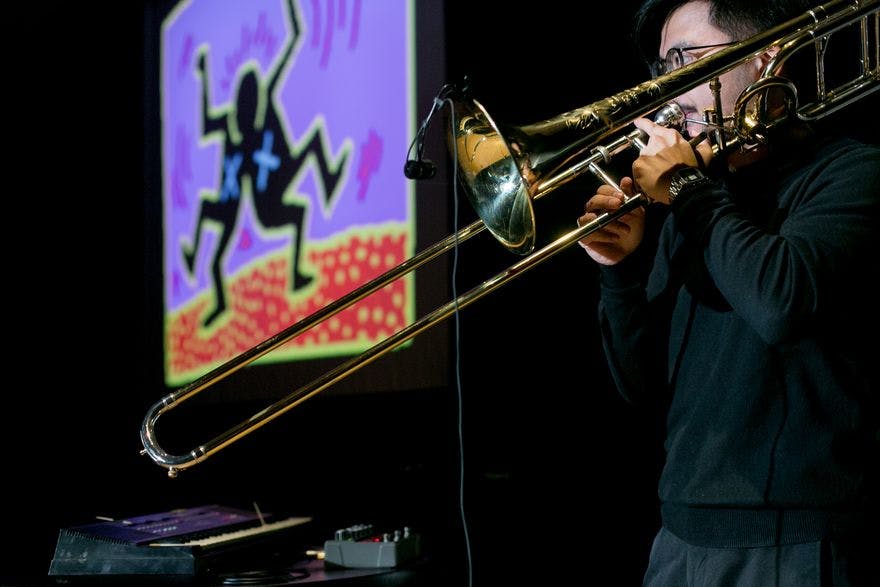
Imagine composing music with Emily Dickinson or digitally painting with Keith Haring. At The New School, this is entirely possible. Here history is more than a subject; it's a dynamic, living creative partner. In the classroom, students make the past relevant by reexamining historical material and reinterpreting it through present-day critical theory and media. A new course called Shelf Life at The New School's College of Performing Arts epitomizes the university's dedication to paving new paths, forging inventive and high-impact forms of scholarship, and reflects the university's profound connection to New York City and its resources. This unique pedagogy frees students to transcend time and space.
During the fall 2017 semester, Shelf Life immersed six College of Performing Arts students-five from the School of Jazz and one from Mannes School of Music-in arguably the world's foremost performing arts library. To prepare for a performance at the end of the semester, students Nick Dunston, Kalun Leung, Blake Opper, Michael Sheelar, Zosha Warpeha, and Stephen Williams were granted open access to the New York Public Library Archives with gracious support from Evan Leslie, Artistic Producer at Lincoln Center's New York Public Library for the Performing Art. Students were tasked with creating original compositions from their research. Their only requirement was that they “bring the archives to life.”
New School Jazz professor, saxophonist, composer, and GRAMMY Award winner Jane Ira Bloom conceived Shelf Life during her own time in the archives. In early September 2017, Bloom released the piece Wild Lines: Improvising Emily Dickinson, which she wrote for a jazz quartet and premiered at the library's Bruno Walter Auditorium. Wild Lines came about after Bloom was inspired by Dickinson's improvisation with both words and music. Bloom hadn't known that the poet was also a pianist until she started researching her work in the archives. Impressed by the richness that research brought to her composition, Bloom couldn't wait to share it with her students. She says, “The New School was the perfect place for this initiative. Students learn tradition by applying it to their own expression through original music. I feel tremendously proud to be at a university where students are given freedom to find inspiration.”
A project like Shelf Life encourages students to look beyond their comfort zone for inspiration. Warpeha, who is in a dual-degree program at the School of Jazz and Eugene Lang College of Liberal Arts, normally turns to nonverbal phenomena, such as elements of nature, when composing. She was surprised by how much the archival materials moved her. Speaking about her solo performance on the Hardanger fiddle, she says, “I found a collection of three 300-page volumes from the '80s that analyzed three or four traditional Norwegian folk songs. At first I was resistant, expecting to dislike the dense text. But when I opened the book, I discovered that it was full of wonderful drawings and descriptions that illustrated elusive compositional tendencies in the music in ways I'd never imagined.”
Rethinking archival research transforms the academic experience and allows students to explore their field's discourse through an unexpected lens. Dunston, who is also in the dual-degree program, gained a new perspective on his approach to music. At the outset, he wanted to illuminate the past through music and investigated racial identity and identity politics of the avant-garde music scene in New York in the 1960s and early 1970s. During the process, he uncovered handwritten poetry by Amiri Baraka. As a Black and Puerto Rican musician, Dunston felt a deep connection with Baraka's words and developed a strong affinity for Baraka's storytelling. This experience inspired Dunston to elevate his music and compose one of the most personal works of his career thus far.
Rethinking the past helps a student define who he or she is today. Leung, a Mannes student who will receive his Professional Studies Diploma on trombone next year, says, “While working on my Shelf Life composition, I collaborated with the past like a time traveler.” He believes that none of his past academic experiences, including his studies for a graduate degree from McGill University in Montreal, have been quite like his time at The New School. He explains, “The College of Performing Arts has had a profound effect on my music. They let me flow where I need to flow, and they don't try to shape me. Shelf Life is a great example of the type of learning I've been afforded here.”
The New School, with its radical approach to history, is a force of new documentation, expression, and connection. Be a Force of New.